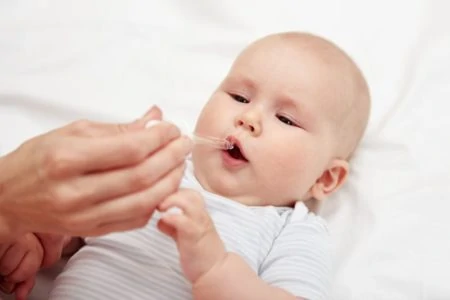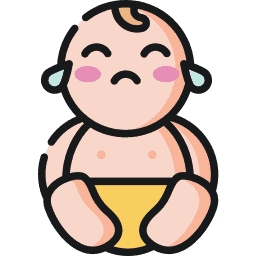Welcome to the spit-up phase of parenting. It involves a surprising amount of laundry, a constant supply of burp cloths, and the nagging worry that something might be wrong with your little squirming bundle.
If your baby is struggling to feed or constantly returning their lunch onto your shoulder, it is natural to feel anxious. Is this just a messy habit? Or does it signal a serious medical problem like GERD?
Take a deep breath. Let’s break down the causes of reflux, how to tell the difference between a “happy spitter” and a sick baby, and simple ways to manage the mess.
Key Takeaways
- Spitting up is usually a normal side effect of an immature digestive system (specifically the esophageal valve).
- Normal spit-up flows effortlessly; vomiting is forceful and causes distress.
- You can often reduce reflux by keeping the baby upright after feeds and burping frequently.
- Consult a doctor immediately for projectile vomiting, green bile, or failure to gain weight.
Is Baby Spit Up Normal?
Short answer: Yes. Spitting up is incredibly common and, in most cases, completely normal (1). It typically happens right after a feed, though it can surprise you one or two hours later.
Think of this as a laundry problem rather than a medical emergency. Doctors often refer to infants who regurgitate without pain or poor weight gain as “happy spitters.”
Most babies outgrow this phase naturally. It usually peaks around four months and resolves itself by the time they reach their first birthday. So hang in there; your washing machine will get a break eventually.
Why Do Babies Spit Up?
Spit-up happens because your little one’s anatomy is a work in progress.
There is a muscle valve between the esophagus and the stomach called the lower esophageal sphincter (LES). Its job is to open to let food in and close to keep it down. In babies, this muscle is often weak or underdeveloped. It acts like a loose lid, allowing milk to slosh back up (2).
Aside from anatomy, other factors can trigger excessive spit-up:
- Oversupply of breast milk: If you have a forceful letdown, your baby might gulp milk too quickly. This overfills their tummy and leads to reflux-like symptoms (3).
- Food sensitivities: If you are breastfeeding, certain foods in your diet might disagree with your baby. If formula feeding, they might be sensitive to cow’s milk protein.
- GERD: If spit-up is constant and causes pain, it could be Gastroesophageal Reflux Disease. We will cover this in detail below.
If you suspect a sensitivity, look at your baby’s diet (or yours). Common culprits include dairy or soy.
However, don’t stress too much about your diet unless you see other signs of allergy, such as eczema or bloody stools. If your baby is happy and gaining weight, your latte or spicy dinner is likely not the enemy (4).
Identifying Spit Up vs. Vomit
It is crucial to know the difference between normal reflux and vomiting.
Spit-up is effortless. It flows out of the baby’s mouth, often with a “burp,” and looks like creamy milk or cottage cheese.
Vomiting is forceful. It involves retching and heaving, and the stomach contents shoot out violently.
If the spit-up is green, yellow, or contains red streaks (not related to cracked nipples), that is a warning sign. Green bile suggests a blockage, and you should call your doctor immediately.
When to See a Doctor
While occasional vomiting can happen, consistent violent vomiting requires medical attention.
Consult your pediatrician if your baby isn’t gaining weight, seems constantly miserable, or if you notice any of these red flags:
- Forceful, projectile vomiting.
- Green or yellow fluid (bile).
- Appearance of “coffee grounds” (dried blood) or fresh blood in the vomit.
- Refusal to eat or difficulty swallowing.
- Fewer wet diapers (signs of dehydration).
Remember
Gastroesophageal Reflux Disease (GERD)
GER (Gastroesophageal Reflux) is the normal spitting up we discussed. GERD (Gastroesophageal Reflux Disease) is when that reflux causes complications, pain, or damage.
While rare compared to normal spit-up, GERD can make feeding time a nightmare for parents and babies alike.
Symptoms of Baby Reflux (GERD)
You need to play detective here. Signs of GERD are usually persistent rather than one-off events (5). Look for:
- Arching the back: Babies often arch their backs during or after feeds to stretch out the esophagus and relieve pain (Sandifer syndrome).
- Feeding refusal: They might be hungry but pull away from the nipple after a few sucks because it hurts.
- Poor weight gain: If they can’t keep enough calories down, their growth will stall.
- Chronic cough: Stomach acid can irritate the throat and airways.
- Extreme fussiness: We are talking about inconsolable crying associated with feeding times.
What About Silent Reflux?
This is the “sneaky” version of reflux. The stomach contents travel up the esophagus, causing the burn, but the baby swallows it back down before it hits the chin.
With silent reflux, you won’t see the mess, but you will see the pain. Watch for sudden crying when lying flat, sour breath, frequent hiccups, and swallowing noises when they haven’t been fed recently.
How to Prevent Infant Reflux
If your baby is a “happy spitter” gaining weight well, you generally do not need medication. However, you can make life easier (and cleaner) with these management techniques.
1. Adjust Your Feeding Technique
Gravity is your best friend. Keep your baby’s head elevated above their tummy during feeds. If you are using a bottle, tilt it so the nipple is full of milk, not air.
If breastfeeding, try to ensure a deep latch so they aren’t gulping air pockets. Air bubbles in the stomach act like a plunger, pushing milk back up.
2. Master the Burp
Don’t wait until the bottle is empty to burp. Stop halfway through the feed (or when switching breasts) to get the air out.
After the feed, keep the baby upright for 20 to 30 minutes. This gives the stomach time to settle before you lay them down for a diaper change or nap.
3. Try Smaller, Frequent Meals
A very full stomach puts pressure on that weak LES valve. Think of it like overfilling a water balloon; if you squeeze it, it pops.
Try feeding smaller amounts more frequently. This makes digestion easier and reduces the internal pressure that forces milk back up.
4. Check Sleeping Position
While you must always put your baby to sleep on their back to prevent SIDS, you can elevate the head of the crib slightly.
Safety Note: Do not use pillows or loose wedges inside the crib. Instead, place a safe crib wedge or rolled towel under the mattress to create a gentle incline. Always ask your pediatrician before altering the sleep environment.
5. Monitor Your Caffeine Intake
If you are breastfeeding, check your coffee habit. Caffeine relaxes muscles, including the esophageal sphincter. If you have a high intake of caffeine, it might be loosening that “lid” on your baby’s stomach.
Try limiting yourself to one or two cups a day to see if it makes a difference.
6. Skip the Smoke
Secondhand smoke is a known trigger for reflux. Nicotine relaxes the valve between the stomach and esophagus (6).
If you smoke, the best thing you can do for your baby’s reflux (and overall health) is to quit. If you cannot quit yet, never smoke around the baby, and change your clothes immediately after smoking before holding them.
7. Consider Allergies
If the reflux is accompanied by a rash, mucousy poop, or blood in the stool, it might be a Cow’s Milk Protein Allergy (CMPA).
In this case, your doctor might recommend a hypoallergenic formula or ask you to eliminate dairy and soy from your diet (7).
Treatments and Remedies for Infant GERD
If hygiene and positioning hacks aren’t cutting it, your doctor might suggest these interventions.
1. Thickened Feeds
Thickening formula or expressed milk with a little baby oatmeal or rice cereal makes it heavier and harder to spit up.
Do not do this without medical advice. Adding cereal changes the nutritional balance and calorie count of the milk. It can also pose a choking hazard if the mixture is too thick or the bottle nipple hole is too small (8).
2. Gripe Water
Gripe water is an herbal supplement containing ingredients like fennel and ginger. While scientific evidence is thin, many parents swear by it for settling gassy tummies.
Always check with your doctor before introducing supplements, and ensure the brand you choose is sugar-free and alcohol-free.
3. Prescription Medication
For true GERD where the baby is losing weight or in pain, doctors may prescribe acid-suppressing medicines like H2 blockers or proton pump inhibitors (PPIs).
These don’t stop the spit-up; they just reduce the acid so it doesn’t burn. Current guidelines suggest using these only for severe cases, as stomach acid is necessary for digestion and fighting bacteria.
Baby Reflux FAQs
Will the Spit Ups Ever End?
The good news is that this phase is temporary. As your baby’s muscles get stronger and they spend more time upright, that pesky valve in their stomach will tighten up.
In the meantime, invest in some oversized bibs, keep a spare shirt for yourself in the diaper bag, and remember that as long as your baby is smiling and growing, you are doing a great job.
If your gut tells you something is wrong, or if the crying becomes unmanageable, never hesitate to reach out to your pediatrician. You know your baby best.











